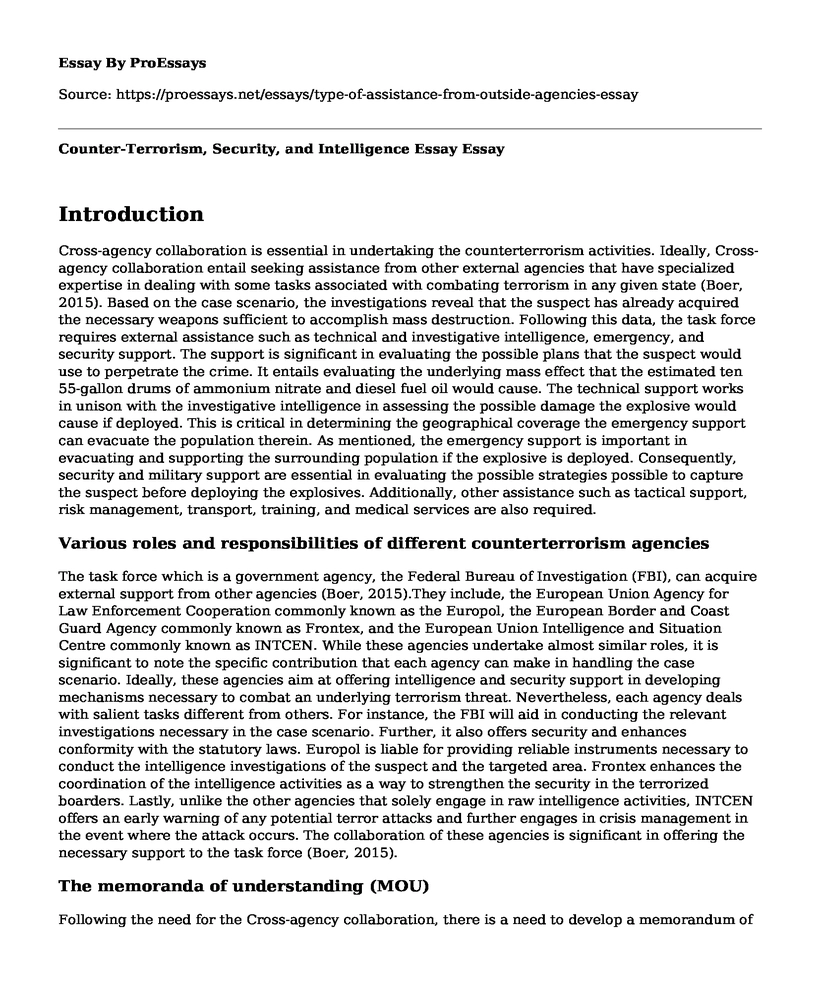Introduction
Cross-agency collaboration is essential in undertaking the counterterrorism activities. Ideally, Cross-agency collaboration entail seeking assistance from other external agencies that have specialized expertise in dealing with some tasks associated with combating terrorism in any given state (Boer, 2015). Based on the case scenario, the investigations reveal that the suspect has already acquired the necessary weapons sufficient to accomplish mass destruction. Following this data, the task force requires external assistance such as technical and investigative intelligence, emergency, and security support. The support is significant in evaluating the possible plans that the suspect would use to perpetrate the crime. It entails evaluating the underlying mass effect that the estimated ten 55-gallon drums of ammonium nitrate and diesel fuel oil would cause. The technical support works in unison with the investigative intelligence in assessing the possible damage the explosive would cause if deployed. This is critical in determining the geographical coverage the emergency support can evacuate the population therein. As mentioned, the emergency support is important in evacuating and supporting the surrounding population if the explosive is deployed. Consequently, security and military support are essential in evaluating the possible strategies possible to capture the suspect before deploying the explosives. Additionally, other assistance such as tactical support, risk management, transport, training, and medical services are also required.
Various roles and responsibilities of different counterterrorism agencies
The task force which is a government agency, the Federal Bureau of Investigation (FBI), can acquire external support from other agencies (Boer, 2015).They include, the European Union Agency for Law Enforcement Cooperation commonly known as the Europol, the European Border and Coast Guard Agency commonly known as Frontex, and the European Union Intelligence and Situation Centre commonly known as INTCEN. While these agencies undertake almost similar roles, it is significant to note the specific contribution that each agency can make in handling the case scenario. Ideally, these agencies aim at offering intelligence and security support in developing mechanisms necessary to combat an underlying terrorism threat. Nevertheless, each agency deals with salient tasks different from others. For instance, the FBI will aid in conducting the relevant investigations necessary in the case scenario. Further, it also offers security and enhances conformity with the statutory laws. Europol is liable for providing reliable instruments necessary to conduct the intelligence investigations of the suspect and the targeted area. Frontex enhances the coordination of the intelligence activities as a way to strengthen the security in the terrorized boarders. Lastly, unlike the other agencies that solely engage in raw intelligence activities, INTCEN offers an early warning of any potential terror attacks and further engages in crisis management in the event where the attack occurs. The collaboration of these agencies is significant in offering the necessary support to the task force (Boer, 2015).
The memoranda of understanding (MOU)
Following the need for the Cross-agency collaboration, there is a need to develop a memorandum of understanding (MOU) in order to establish the duties and responsibilities that each participant will undertake (Eckenwiler, & Hunt, 2014). The MOU also outlines the mission of the collaboration and thus formalizes the agreement between the FBI and other external agencies therein. Since these agencies work in unison by sharing information necessary to combat the potential terrorist activity, the agreement has to conform to the federal law. Nevertheless, the MOU does not create any right to benefit from any of the parties or an agreement with the law. In this case, therefore, the existing agreements, if any, are secured by the task force (FBI).
References
Boer, M. (2015). Counter-Terrorism, Security, and Intelligence in the EU: Governance Challenges for Collection, Exchange, and Analysis. Intelligence And National Security, 30(2-3), 402-419. doi: 10.1080/02684527.2014.988444
Eckenwiler, L., & Hunt, M. (2014). Counterterrorism, Ethics, and Global Health. Hastings Center Report, 44(3), 12-13. doi: 10.1002/hast.308
Cite this page
Counter-Terrorism, Security, and Intelligence Essay. (2022, Jun 06). Retrieved from https://proessays.net/essays/type-of-assistance-from-outside-agencies-essay
If you are the original author of this essay and no longer wish to have it published on the ProEssays website, please click below to request its removal:
- Critical Thinking Example: Will NAFTA Survive a Trump's Presidency?
- The Sociology of Crime and Deviance - Research Paper
- Justice in Disguise - Essay Sample
- Critical Reflection on the Plight of Immigrants in Relation to My Experience as an E.U. Citizen Living in the U.K.
- Essay Example on Women's Strength: Mary Wollstonecraft's Reflections on Equality
- Paper Example on IAWP: Strengthening Women in Policing since 1915
- The Hate U Give: A Reflection of Black Lives Matter Movement in Contemporary America - Free Report







